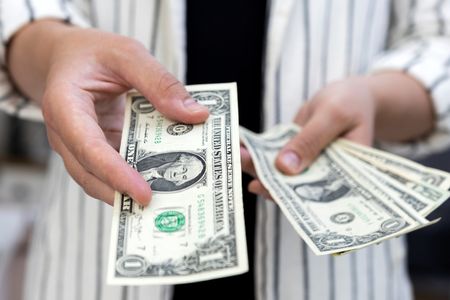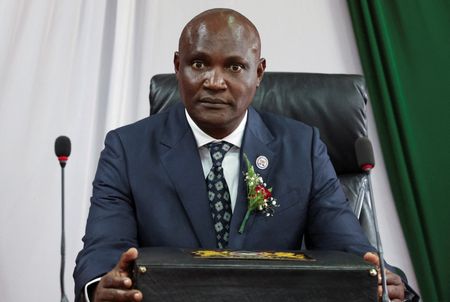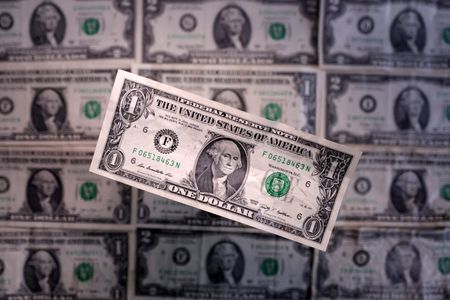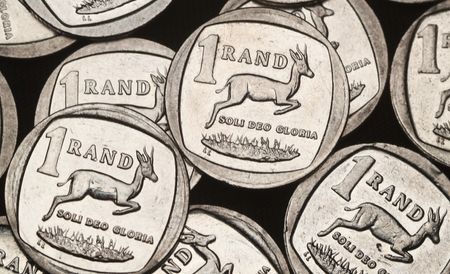By Gertrude Chavez-Dreyfuss
NEW YORK (Reuters) – The dollar extended its decline on Monday in the wake of Friday’s weak U.S. jobs report, which all but cemented an interest rate cut this month, even as the yen fell after Japanese Prime Minister Shigeru Ishiba announced his resignation over the weekend.
In Europe, the euro showed little reaction to news that France’s parliament voted to oust Prime Minister Francois Bayrou on Monday. The parliament brought down the government over its plans to tame the ballooning national debt, plunging the euro zone’s second-largest economy deeper into political crisis.
Europe’s common currency was last up 0.2% on the day versus the dollar at $1.1751.
Analysts said the outcome of the vote had been expected.
In Japan, Ishiba on Sunday said he would step down, ushering in a potentially lengthy period of policy uncertainty for the world’s fourth-largest economy, the most heavily indebted industrialised nation.
That pushed the yen lower across the board and by mid-morning trading the dollar was up just 0.2% against the Japanese currency at 147.695, after rising by as much as 0.8% on the day.
But the market’s attention remained firmly pinned on the U.S. dollar after a non-farm payrolls shock on Friday which reinforced expectations that the Federal Reserve will resume cutting interest rates at a policy meeting later this month.
“The driving force in the foreign exchange market remains the dollar and U.S. developments,” said Marc Chandler, chief market strategist at Bannockburn Forex in New York.
“People can talk about Japanese politics, but the real driver of dollar/yen is not Japanese politics, or Japanese interest rates. It’s U.S. interest rates, and with the market pricing in about a 10% chance of a 50 basis-point cut, the dollar is falling.”
Fed funds futures are pricing in a 90% chance of a standard 25 basis-point cut this month and a 10% chance of 50-bp rate decline, according to LSEG estimates.
The nonfarm payrolls report showed U.S. job growth plunged in August and the unemployment rate increased to nearly a four-year high of 4.3%.
The dollar index edged down 0.4% to 97.51, having slipped more than 0.5% on Friday.
Against the Swiss franc, the dollar fell to its lowest since July 24, and was last down 0.5% at 0.7937.
UPTICK IN THE DOLLAR?
“We feel there’s a chance for a surprise uptick in the dollar especially if the inflationary figures to arrive in the form of PPI (producer price index) and CPI (consumer price index) paint a picture in which prices are just simply getting out of control,” said Juan Perez, director of trading at Monex USA in Washington.
In other currency pairs, the yen slid against the euro, falling to its lowest in more than a year. The euro was last up 0.4% at 173.40 yen.
Investors are also focused on the possibility that Japan’s Ishiba could be replaced by an advocate of looser fiscal and monetary policy, such as Liberal Democratic Party veteran Sanae Takaichi, who has criticised the Bank of Japan’s interest rate hikes. Japanese stocks earlier surged while government bonds (JGBs) were steady, although yields on super-long JGBs hovered near record highs.
The yen hardly reacted to data on Monday showing Japan’s economy expanded much faster than initially estimated in the second quarter.
Elsewhere, sterling edged up 0.3% against the dollar to $1.3545, having risen more than 0.5% on Friday.
The Australian and New Zealand dollars rose 0.5% to US$0.6590 and 0.8% to US$0.5938, respectively.
Also last Friday, U.S. Treasury Secretary Scott Bessent called for renewed scrutiny of the Fed, including its power to set interest rates, as the Trump administration intensifies its efforts to exert control over the central bank.
President Donald Trump is considering three finalists to replace Fed Chair Jerome Powell, whom he has criticised all year for not cutting rates as he has demanded.
(Reporting by Gertrude Chavez-Dreyfuss; Additional reporting by Amanda Cooper in London and Rae Wee in Singapore; Editing by Jamie Freed, Jacqueline Wong, Hugh Lawson, Harikrishnan Nair, Franklin Paul and Edmund Klamann)











